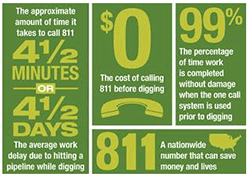
A quick call to 811 can save downtime, repair costs, fines and lives
 Despite knowing there is risk in digging, a study conducted by Enbridge in 2014 shows nearly 71 percent of farmers and ranchers have never called 811 to have pipelines marked before beginning a digging project, putting themselves and their operation at risk.
Despite knowing there is risk in digging, a study conducted by Enbridge in 2014 shows nearly 71 percent of farmers and ranchers have never called 811 to have pipelines marked before beginning a digging project, putting themselves and their operation at risk.The survey suggests misconceptions about the 811 service discourage farmers from making the call. For example, two-thirds of farmers were aware of the 811 service, which marks pipelines on property. Of those who did know about the service, more than half didn't know the call is free and provides pipeline markings that are valid for up to three weeks.
Survey data suggests farmers are aware of the risks associated with hitting buried lines -- specifically the potential to ignite oil or gas released from pipelines and put operations and lives at risk -- yet only 29 percent of polled farmers have ever used the service. Of those, less than half always use it.
"I was raised on a farm, and I know that farmers know their land well," said Kesley Tweed, partnerships and public awareness manager for Enbridge. "However, I also know farmers want to make sure they're doing everything they can to protect their family and employees. This survey showed us there are definitely some misconceptions about pipelines and the 811 service that we hope to clear up so farmers and others can work safely around pipelines."
"I found this poll eye opening," said Brad Shamla, vice president of U.S. Liquids Pipelines Operations. "We hope that by clearing up misperceptions, farmers along our pipelines will understand the importance and take a few minutes to call 811, have lines marked, and play it safe - for the safety of the community and the well-being of the operation."
Among the common misperceptions, a majority (64 percent) were unaware that lines can be as shallow as 18 inches or less. (The depth of pipelines can vary due to erosion, digging projects and other factors.) Lines can be marked one-to-three days after the initial call and markings are valid for up to three weeks.
The big picture
According to the Pipeline & Hazardous Materials Safety Administration, more than 2.6 million miles of pipelines deliver energy across the United States. In 2013, digging accidents contributed to the loss of nearly 25,000 barrels of oil, while also damaging farm property.
In 2013, Enbridge data identified four pipeline strikes resulting from agriculture-related digging and seven close encounters. Tweed said, "Those numbers may seem low to some people. But at Enbridge, we feel that one accident is too many, particularly when an accident is easy to prevent with a call to 811.
Agriculture-related pipeline incidents are caused by projects ranging from fence installation to ditching and trenching to cleaning out ponds. The study showed that 93 percent of farmers plan digging projects in advance, providing plenty of time to call the required 2-3 business days in advance. Separate research proves that 99 percent of digging projects that are preceded by a call to have lines marked are completed without incident.
Using 811
Calling 811 is free and can be done from anywhere in the country a few days prior to digging. The call will be transferred to a local One Call Center. After telling the operator where the digging will occur and what type of work will be done, the operator will inform local utilities companies about the intent to dig. Following the call, a locator will come to the specified site to mark the location of underground lines, pipes and cables so the caller will be well informed and able to dig safely. The process takes one to three days from the call to placing the pipeline markers. State laws require operators to mark the lines within 2-3 business days. In addition to the 811 toll-free telephone number, some states now offer online one call requests. Visit call811.com for more information.
About Enbridge
Enbridge Energy Partners, L.P. owns and operates a diversified portfolio of crude oil and, through its interests in Midcoast Energy Partners, L.P. ("Midcoast Partners"), natural gas transportation systems in the United States. Its principal crude oil system is the largest pipeline transporter of growing oil production from western Canada and the North Dakota Bakken formation. The system's deliveries to refining centers and connected carriers in the United States account for approximately 17 percent of total U.S. oil imports. Midcoast Partners' natural gas gathering, treating, processing and transmission assets, which are principally located onshore in the active U.S. Mid-Continent and Gulf Coast areas, deliver approximately 2.5 billion cubic feet of natural gas daily. Enbridge Partners is recognized by Forbes as one of the 100 Most Trustworthy Companies in America.
1.29.2015